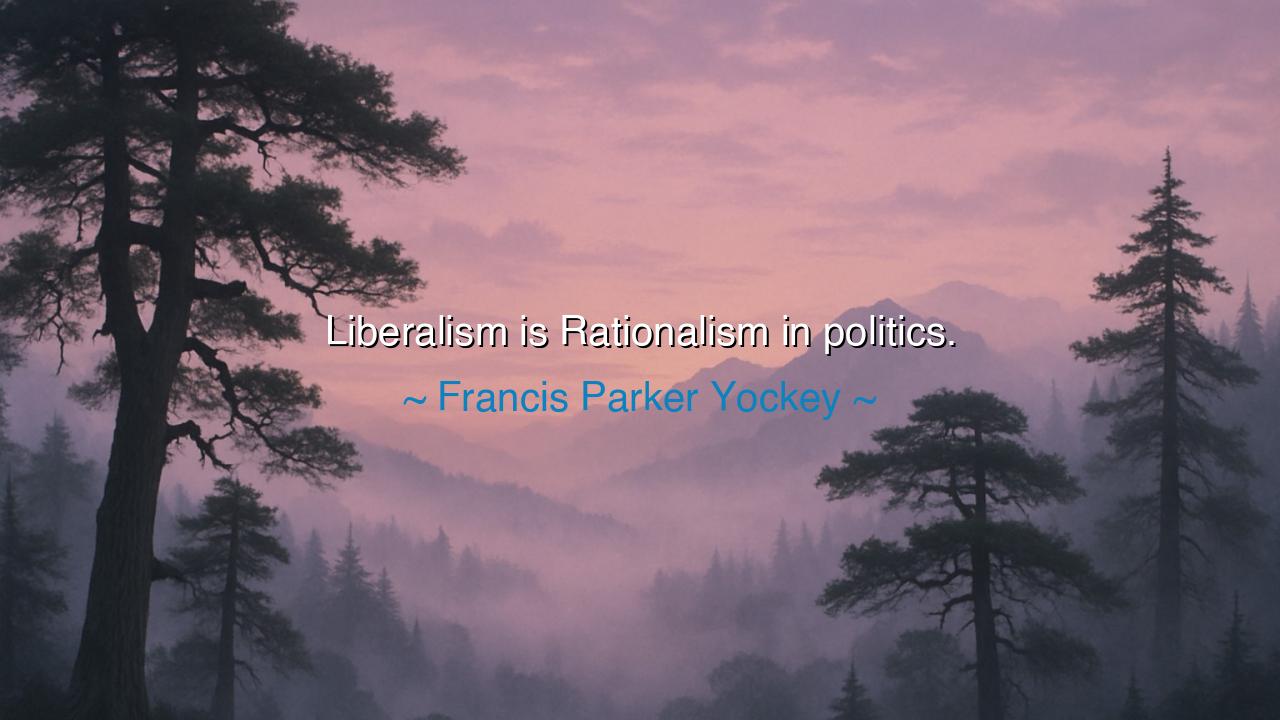
Liberalism is Rationalism in politics.






O children of the future, hear the profound words of Francis Parker Yockey, who boldly declared, "Liberalism is Rationalism in politics." In these words, he unveils a deep truth: that the political philosophy of liberalism, with its emphasis on individual freedom, reason, and progress, is grounded in the belief that humanity can, through logic and reason, create a better, more just world. Yet, this is not without its peril, for rationalism, in its purest form, seeks to divorce itself from the traditions and values that have long guided societies, replacing them with abstract ideas of progress and equality. Yockey warns that while liberalism promises freedom and equality, it may also, if unchecked, lead to a cold, mechanistic view of the world where the complexities of human experience are reduced to mere calculations.
In the ancient world, the great philosophers of Greece were the first to explore the depths of reason and rationality in politics. Plato and Aristotle sought to understand how society could be ordered for the common good, though their answers were rooted in different ideas of virtue and the nature of human beings. Yet, both believed that the philosopher-king, guided by reason, should lead. Their ideas laid the foundation for the development of rational thought in political matters, where the emphasis would be placed not on tradition or divine will, but on the capacity of human reason to order society. Yockey’s words echo this ancient debate, for in liberalism, reason becomes the central force driving political change.
Consider the example of The French Revolution, when the forces of rationalism rose to challenge the old monarchies. The revolutionaries, inspired by the Enlightenment ideals of reason, sought to establish a society based on the principles of liberty, equality, and fraternity. They believed that by applying rational thought to the organization of society, they could create a more just and equal world. Yet, the outcomes of this radical rationalism were not without consequence, for the revolution also unleashed violence and chaos, as abstract ideas of reason clashed with the deeply rooted customs of the people. This tension between rationalism and tradition speaks to Yockey’s caution: that the pursuit of reason in politics can lead to an erosion of the very values that sustain a community.
The liberal tradition, with its rationalist underpinnings, has persisted in the modern world, as democratic governments have sought to apply the principles of reason and individual rights to the organization of society. Yet, even in our time, the question remains: Can rationalism alone provide the answers to the complex problems of the human soul? The American Revolution, built on the Enlightenment ideals of reason and the rights of man, succeeded in establishing a government of liberty. But even in this land of reason, we still struggle with inequality, discontent, and division. Yockey’s words serve as a reminder that while reason in politics can achieve great things, it cannot alone heal the deep human wounds of history.
O children, let the words of Francis Parker Yockey resonate deeply within you. Liberalism, as rationalism in politics, carries with it the promise of progress and equality, but also the danger of reducing the richness of the human experience to mere intellectual constructs. As we march forward into the future, let us remember the wisdom of the ancients and recognize that while reason must guide us, it must be tempered with the traditions, values, and emotional truths that make us human. The future is not merely a calculation of reason, but a dance between the heart and mind, between freedom and the common good. May we build a world where both are honored, and where the mistakes of the past are not repeated in the name of reason alone.






PLNguyen Ngoc Phuong Linh
The idea that liberalism is rationalism in politics by Yockey is an interesting one. It suggests that liberalism is about applying reason and logic to political problems, but I wonder if this implies that all political decisions should be made purely on reason alone. Politics is often driven by values, ideologies, and historical contexts. How can rationalism, as described here, account for these factors that influence real-world politics?
SDSon Duy
Yockey’s assertion that liberalism is rationalism in politics could be seen as an attempt to reduce a complex ideology to a logical structure. But does that view account for the moral and ethical considerations that often underpin liberal thought? Liberalism isn’t just about reason; it’s also about rights, freedom, and equality. How do we incorporate these values into the idea of rationalism in politics, and can they be truly separated?
KVKieu Vy
This perspective on liberalism as rationalism makes me question whether political ideologies are ever purely rational. While liberalism may seem to focus on reason and logic, politics is often about power, identity, and competing interests. Is it possible for politics to be entirely rational, or does human emotion always play a significant role in shaping political outcomes? How do we reconcile the rational ideals of liberalism with the complexities of human society?
YNYen Nhi
Francis Parker Yockey’s definition of liberalism as rationalism in politics makes me think about the relationship between reason and political ideology. Is liberalism truly just about rational thought, or does it sometimes rely on idealism or other emotional factors? How does rationalism account for the social and moral dimensions that often drive political movements? Is the reliance on reason enough to create a just and effective political system, or are other elements necessary?
QNQuynh Nhu
Yockey’s claim that liberalism is rationalism in politics might be an attempt to show that liberalism is driven by logic and practical reasoning. But is this an oversimplification? Politics involves not only reason but also values, emotions, and historical context. Can we really separate rationalism from other political forces like identity, power dynamics, or tradition? How does this view account for the role of ideology and human behavior in political systems?